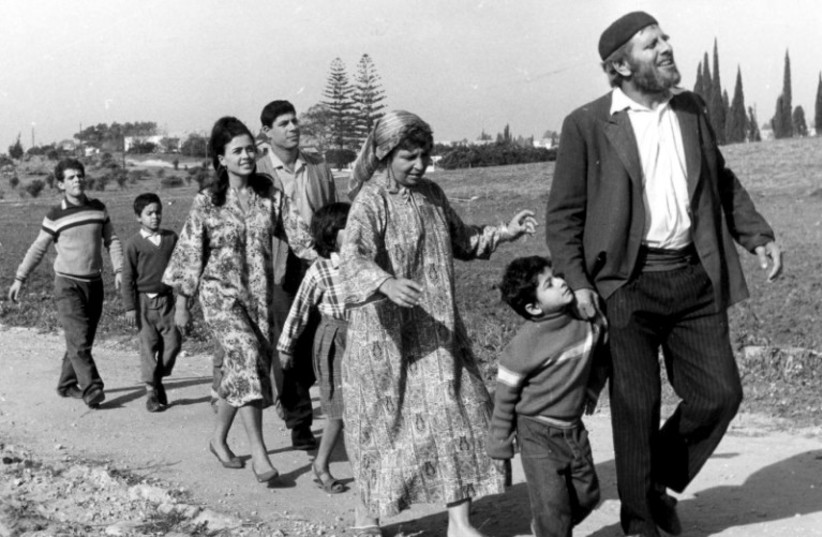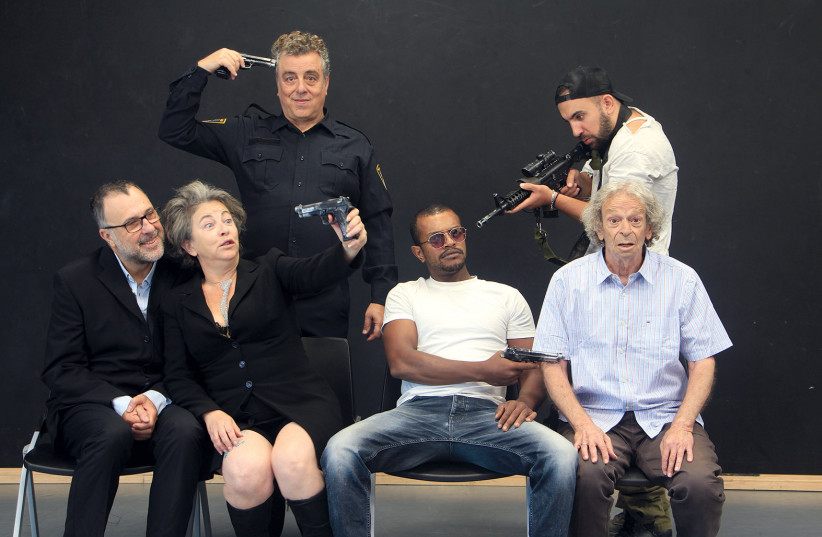Other than the terminally optimistic among us, we all know that sinking feeling in the pit of the stomach, a sense of hopelessness and helplessness that periodically pervades our quotidian consciousness. Things just don’t seem to be panning out the way we’d planned or thought they would. The source of the blues could be personal or might be brought on by some depressing regional development, the persistence of a trying state of affairs to simply not resolve itself.
Then again, as Reader’s Digest championed decades ago, laughter is the best medicine. And there has been no one better in this part of the world at getting us to perk up and possibly even smile if not laugh out loud than Ephraim Kishon.
Our national satirist was a prolific and supremely gifted writer of comedic material across numerous disciplines. His books have been translated into 37 languages, while his theatrical productions and movies have been well received. The latter field of activity brought him global recognition of the highest order, with two Oscar nominations and a brace of Golden Globe awards for Best Foreign Language Film, for Sallah Shabati (1964) and The Policeman (1971). With that kind of track record, who better than Kishon, who died in 2005 at the age of 80, to thematically anchor and lend his name to the inaugural edition of the Israeli Comedy Festival?
The festival, initiated by the Incubator Theater and members of the Kishon family, is due to run at seven venues across Jerusalem from August 21-27. Artistic director Yiftach Leibovitch says the event has been gestating for quite some time, at least on a personal level. “I grew up with Kishon’s books. They were all around the house when I was a kid. And we had several copies of each.”
So, who better to put together a variegated multi-layered salute to Kishon and present a taste or two of where Israeli comedy is currently while he’s at it?

The legacy of Israeli satirist Ephraim Kishon
THE LEGACY of a great artist stems not only from the works he or she created and, of course, their universal appeal and timelessness, but also in the way they leave their imprint on later generations of creators and how the youngsters follow in their role model’s footsteps. That comes across clearly in the half dozen contemporary productions in the festival program. As befitting Kishon’s incisive analytical view of life over here, several of the shows tend toward the darker regions of the humor scale, although colored with something akin to burlesque seasoning. Some even touch on areas that, for most Israelis, belong to the sacred cow category.
Take, for example, HaMe’ahevet Shel Mar Achbar (Mr. Mouse’s Lover), which offers a very different view of Israel Prize laureate writer Leah Goldberg’s popular 1959 children’s book Dira LeHaskeer (A Flat for Rent). The play, which was written by Roy Reshef Maliach, directed by Yafim Ronenberg and produced by the Mikro Theater company, offers a sardonically comedic angle on neighborly dynamics. Considering the Goldberg book was prompted by the socio-political unrest in Haifa’s Wadi Salib neighborhood at the time, the Reshef Maliach angle suits.
But it is not entirely doom and gloom-fueled on the here-and-now side of the festival roster. Leibovitch points to some intriguing notions in, for example, Narkis – Daffodil or Narcissus by Binyamin Yom Tov. “He got the idea for the work after he noticed some interesting behavior by crows. Crows gather in circles and pass on information to each other, things like where they can find food and such. You have communities of crows that convey information between them.” That sounds fascinating and, apparently, may not be confined to internal ornithological issues. “Yom Tov started thinking about the things the crows may be exchanging about us human beings,” Leibovitch laughs.
THINGS TURN a little darker when Yom Tov starts getting into the nitty-gritty of everyday life, at least as that is portrayed in the media. “He talks about how the information our ‘tribe’ passes on is the latest edition of the news,” Leibovitch explains. “He suggests that, maybe, we should consider passing on more positive things to each other.”
Earlier, I noted that news programs – not that I catch them very often – generally pile on the misery, with the vast majority of stories coming from the downside of life here on terra firma. I recalled that the news often ends with a more lighthearted, happy item such as a panda bear giving birth in a zoo somewhere. Leibovitch picks up on that and says that is very much part of the Yom Tov mindset. “He says that if we started talking about healthier things of a sunnier nature, maybe something would change inside us for the better.”
That is a sentiment to which Kishon would probably have subscribed. Despite his left-field approach to the world around him and his propensity for homing in on the absurdities of life, Leibovitch says there was nothing malicious about him and his viewpoint. “He laughed at things, but he was never cynical.”
“He laughed at things, but he was never cynical.”
Yiftach Leibovitch
Kishon was born in Hungary and somehow survived incarceration in several concentration camps. He made aliyah in 1949 and immediately encountered Middle Eastern intransigence when the Jewish Agency clerk summarily Hebraicized his original moniker, Ferenc Hoffman, to the name by which he became known here and across the world. He also got his first taste of cultural diversity when he was billeted in an apartment together with a large Moroccan family.
However, instead of being bewildered by these new developments in his life, or having a sense of cultural alienation, Kishon quickly embraced his new milieu. He also got a decent handle on Hebrew in double-quick time, although he never shook off his Hungarian accent.
But, despite his Zionist fervor and a strong sense of patriotism toward his adopted homeland, he maintained a keen eye for its failings and never missed a trick in poking fun, albeit lovingly, at the farcical facets of officialdom. The nascent state and its often-ham-fisted attempts to struggle to its feet, provided Kishon with rich pickings for his later oeuvre and particularly its tendency to become entangled in copious amounts of red tape. Satirizing bureaucracy lies at the core of the Kishon’s take on life here. “There’s a game called Hachavilah Higeeyah (The Parcel Has Arrived),” says Leibovitch with a chuckle. “The game was created by Kishon. It’s about a parcel arriving for you at the post office, but you have to work your way through a bureaucratic minefield in order to get hold of it. You have to go to the police station and the barber, and all sorts of unexpected places on the way. It’s such a charming game, about the Israeli balagan and all the craziness.”
The festival goers will get a better idea of what made the great man tick by visiting the Kishonland exhibition which will be on display throughout the week at the event’s Ground Zero, Mazia House, which also houses the Incubator Theater company where Leibovitch serves as actor and director. The festival blurb explains that the exhibition seeks to answer the question “Who are you Ephraim Kishon?” in an unconventional way using humor in a non-museum manner and by creating different experiences. In so doing, we will try to present Kishon’s special and diverse image to the Israeli audience as, perhaps, he would have wanted us to know him.”
As he died 17 years ago, it is difficult to second guess how Kishon would have responded to more recent developments here, such as the way the COVID era was handled or how political correctness affects the way we communicate today. That said, the contemporary works festival section certainly brings us up to date, and it is more than likely that Kishon would have applauded the playwrights’ efforts.

The work of Israel's Ofer Knispel
OFER KNISPEL’S darkly compelling work Tireh Kvar Vezehoo (Just Shoot and Get Over It) certainly explores the wackier side of life. The concise program notes describe the play as relating the odyssey of someone who repeatedly attempts to commit suicide. The hapless chap goes by the definitively unsexy name Pinchas Pastlich and after eventually giving up on managing the act on his own, he tries to enlist the help of a rogues’ gallery of shady characters.
The basic storyline involves seven characters, some of whom not only do not succeed in terminating Pastlich’s life, but they also end up paying a high price for their part in the scheme. The writer’s line of thought crosses that of Kishon at some stage. “There is a part where two of the characters argue between them about who deserves to die first,” laughs Knispel, whose packed biography includes stints as a writer for such popular satirical TV shows as HaChartzufim in the 1990s and more recently, Matzav HaUma and Ad Kan. “That is a very Kishonesque mechanism.”
As with his mentor – like Leibovitch, Knispel says he grew up with Kishon’s books – Knispel slips in some weighty socio-political commentary. “The play also looks at disadvantaged groups, like Ethiopians and lone soldiers. There is a lone soldier who suddenly realizes that the State of Israel wants to bring over kids from California and New Jersey so they can die instead of us. He arrives at the conclusion that he came to Israel to be cannon fodder.” While it is unlikely that Kishon would have featured a statement of that nature in his work, the critique angle certainly fits the satirical bill.
Knispel believes he is working in a different playing field than Kishon, for good and bad. “On the one hand, we are a more liberal society today compared with Kishon’s time. But on the other hand, we are far more conservative.” Even so, Knispel believes there would still be plenty of room for maneuver for the late celebrated writer. “I see Kishonesque situations every single day,” he observes, adding that the great man’s comedic ethos lives on. “It is difficult to think of any comedic undertaking in this country that doesn’t have Kishon’s fingerprint in there somewhere.
Indeed, it is hard to envisage life in this country without Kishon’s unique input, not only in his heralded masterpieces, like the aforementioned Sallah Shabati and The Policeman, which starred Haim Topol and Shaike Ophir respectively, there is also his portrayal of the absurd storyline of The Blaumilch Canal and his writing input in sketches performed by Hagashash Hachiver, to mention but a few of his gems.
Either way, the first edition – hopefully this will become an annual event – of the Israeli Comedy Festival offers much in the way of entertainment, possibly a few belly laughs, some eye openers and food for thought. With music shows, standup comedy slots, free theatrical productions for the whole family and movies in the program mix, there is something for everyone around town next week. ❖
For tickets and more information, visit: https://comedy-festival.co.il.
